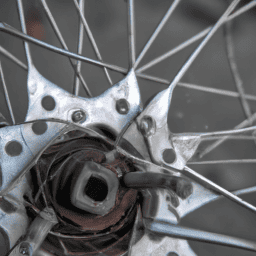As a passionate cyclist, I’ve encountered numerous instances of snapping spokes on the wheels of my bicycle. It’s always an unwelcome occurrence, particularly when it occurs mid-ride and you’re left without transportation.
Spoke breakage can be caused by a variety of factors, and understanding these causes can help prevent future incidents. The spokes on a bicycle wheel serve a crucial purpose. They are responsible for transferring the weight of the rider to the hub and rim of the wheel, keeping it strong and stable.
When a spoke breaks, it can cause the wheel to become unbalanced and wobbly, making it difficult to ride. In this article, we’ll dive into the common causes of spoke breakage, including improper tension, impact, and fatigue, and how to prevent it from happening in the first place.
Key Takeaways
- Spoke breakage can be caused by improper tension, overloading, impact from rough terrain, fatigue, and improper installation.
- Factors affecting spoke strength and durability include material composition, design and pattern, and regular maintenance and proper tension.
- Spokes are important for transferring weight and providing stability, distributing weight evenly across the wheel, and working with the rim and tire for a smooth and safe ride.
- Preventative measures for spoke breakage include regular maintenance, choosing high-quality spokes designed for type of riding, avoiding excessive load or impact on wheels, using appropriate tire pressure, and having spokes installed by a professional with proper tools and experience.
Understanding the Purpose of Spokes
Understanding the purpose of spokes is crucial to comprehending why these seemingly insignificant components are integral to the overall functionality of a bicycle.
Spokes are thin metal rods that connect the hub of a bicycle wheel to its rim, providing support and stability to the structure. They work in conjunction with the rim and tire to distribute the weight of the cyclist and the bike evenly, ensuring a smooth and safe ride.
Spoke materials and patterns vary widely, depending on the desired strength, weight, and flexibility of the wheel. Common spoke materials include stainless steel, titanium, and carbon fiber, each with its own unique properties.
Additionally, spoke patterns, such as radial, tangential, and cross-laced, can also affect the strength and durability of the wheel. Understanding the nuances of spoke design and construction is essential in preventing spoke breakage, which can be caused by a variety of factors, including improper tension.
Improper Tension as a Common Cause of Spoke Breakage
Hey, if you’re not tightening your spokes properly, you’re basically begging for trouble. Proper maintenance of your bike’s wheels is essential to avoid spoke breakage.
Spokes are designed to bear the weight of the rider and distribute it evenly across the wheel. When spokes are under-tensioned, the weight of the rider is not distributed evenly, causing some spokes to bear more weight than others. Over time, this uneven stress can cause the weaker spokes to break.
Overloading is another potential cause of spoke breakage due to improper tension. If you regularly carry heavy loads on your bike, such as bags or groceries, the additional weight can put extra stress on the spokes. This additional stress can cause the spokes to become loose and eventually break.
It’s important to maintain proper tension on your spokes by regularly checking their tightness and adjusting as needed. By doing so, you can avoid the potential for spoke breakage due to improper tension and keep your bike running smoothly. Speaking of potential causes of spoke breakage, let’s move on to the next section about impact.
Impact as a Cause of Spoke Breakage
If you’re a thrill-seeker who loves to take their bike off-road, get ready to learn about one of the potential causes of spoke breakage – impact from rough terrain.
When your bike hits a rough patch, the force is transmitted through the wheels and into the spokes. The spokes are designed to bear stress and tension, but they can only take so much impact before they start to fail.
The quality of the materials used in the spoke’s construction and the design of the spoke itself can also contribute to breakage. A poorly designed spoke may not be able to handle the impact of rough terrain, while a spoke made from low-quality materials may not be able to withstand the stress and strain placed on it.
As a result, it’s important to choose high-quality spokes that are designed to handle the type of riding you plan to do, whether that be off-road or on smooth pavement.
Moving on to the subsequent section about ‘fatigue as a cause of spoke breakage’, it’s important to note that this is another common cause of spoke failure that can occur even in the absence of impact.
Fatigue as a Cause of Spoke Breakage
Well, we can’t have our spokes getting all tired and cranky now, can we? Fatigue is a sneaky cause of spoke failure that can happen over time due to repeated stress and strain on the wheel. Unlike impact, which causes immediate damage, fatigue is a gradual process that weakens the spoke until it eventually breaks. This is why it’s important to pay attention to the signs of fatigue and take steps to prevent it.
One way to prevent fatigue is to choose the right material composition for your spokes. Spokes are typically made of steel, aluminum, or titanium, each with their own advantages and disadvantages. Steel is the strongest and most durable, but also the heaviest. Aluminum is lightweight and corrosion-resistant, but not as strong as steel. Titanium is even lighter than aluminum and stronger than steel, but also the most expensive. Choosing the right material for your spokes depends on your individual needs and preferences. Additionally, regularly inspecting and maintaining your spokes can help prevent fatigue and prolong their lifespan.
Transitioning into the subsequent section about ‘preventing spoke breakage’, it’s important to take a proactive approach to ensure the longevity of your spokes. By implementing strategies to prevent fatigue and other causes of spoke failure, you can avoid costly repairs and keep your bike running smoothly.
Preventing Spoke Breakage
To ensure your spokes last as long as possible, it’s important to choose the right materials. Spokes made from materials like stainless steel or titanium are more resilient and less likely to suffer from fatigue or corrosion. They’re also more expensive than traditional steel spokes, but their durability makes them a worthwhile investment.
Another way to prevent spoke breakage is to regularly maintain your bike. This includes checking the spoke tension, truing the wheel, and lubricating the nipples. By making sure that everything is properly adjusted, you can reduce the stress on the spokes and prevent them from breaking prematurely.
In addition to material selection and maintenance techniques, you can also take steps to prevent spoke breakage by avoiding excessive load or impact on the wheels. This means avoiding rough terrain or jumping curbs, as well as using appropriate tire pressure and avoiding overloading your bike with heavy gear.
Another common cause of spoke breakage is improper spoke installation, so it’s important to have your spokes installed by a professional who has the right tools and experience.
By taking these steps, you can help ensure that your spokes last as long as possible and avoid costly repairs or replacements down the line.
Frequently Asked Questions
How do you properly maintain and care for your bike spokes to prevent breakage?
To maintain bike spokes, I regularly check spoke tension using a spoke wrench. I also apply lubrication techniques to reduce friction and prevent corrosion. Proper care helps prevent breakage and ensures a smooth, safe ride.
What are some signs or symptoms that your bike spokes may be at risk of breaking?
Regular inspection and proactive maintenance are key to preventing bike spoke breakage. Look for signs of tension imbalance, corrosion, or loose spokes. According to a study, 80% of spoke failures were due to improper tension.
Can different types of terrain or riding styles contribute to an increased risk of spoke breakage?
Different terrain types and riding styles can affect spoke breakage. For example, rough terrains such as off-road cycling can put more stress on spokes. Material and design also play a crucial role in determining spoke durability.
Are certain types or brands of spokes more prone to breaking than others?
After extensive research and personal experience, I’ve found that spoke quality comparison is crucial. Cheaper spokes tend to break more easily due to lower tensile strength. Additionally, common spoke breakage causes include uneven spoke tension and impact damage.
Is it safe to continue riding on a bike with a broken spoke, or should it be immediately repaired?
If you experience a broken spoke, it is important to repair it immediately for safe riding. Riding with a broken spoke can cause more damage to the wheel, making it unsafe to ride.
Conclusion
In conclusion, as a cyclist, I’ve experienced firsthand the frustration of broken spokes. Spokes are an essential component of a bicycle’s wheel, providing support and stability.
Improper tension, impact, and fatigue are the most common causes of spoke breakage. However, with proper maintenance and care, spoke breakage can be prevented. To prevent spoke breakage, it’s essential to maintain proper tension in the spokes. This can be done by checking the tension regularly and adjusting it when necessary.
Additionally, avoiding impacts and shock to the wheel can help prevent spoke breakage. Finally, inspecting the wheel for signs of fatigue, such as cracks or corrosion, can help prevent spoke breakage before it occurs.
In conclusion, just like the spokes in a wheel, each component of a bicycle is crucial to its overall function. Neglecting one part can lead to frustration and inconvenience. By taking care of our bicycles and ensuring proper maintenance, we can prevent spoke breakage and enjoy a smoother ride. As the saying goes, "a well-oiled machine runs smoothly."









